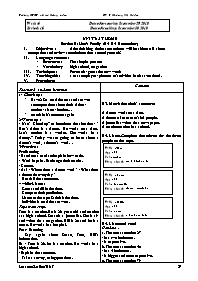Giáo án môn Tiếng Anh Lớp 7 - Unit 3: At home - Section B: Hoa’s Family (B4+B5+Remember) - Y Khương Niê Kdăm

UNIT 3: AT HOME
Section B: Hoa’s Family (B4+B5+Remember)
I. Objectives : After finishing the lesson students will be able to talk about occupation and review some information around yourself.
II. Language contents:
- Structures: The simple present
- Vocabulary high school , magazine
III. Techniques: Pre-teach / guess the new words
IV. Teaching aids: a cassette player - pictures of activities in class-text book.
V. Procedures
Bạn đang xem tài liệu "Giáo án môn Tiếng Anh Lớp 7 - Unit 3: At home - Section B: Hoa’s Family (B4+B5+Remember) - Y Khương Niê Kdăm", để tải tài liệu gốc về máy bạn click vào nút DOWNLOAD ở trên
Week :6 Date of preparing : September 29, 2010 Period : 16 Date of teaching : September 30, 2010 UNIT 3: AT HOME Section B: Hoa’s Family (B4+B5+Remember) Objectives : After finishing the lesson students will be able to talk about occupation and review some information around yourself. Language contents: Structures: The simple present Vocabulary high school , magazine Techniques: Pre-teach / guess the new words Teaching aids: a cassette player - pictures of activities in class-text book. Procedures Teacher & students’ activities Contents Name : Bill Age : 20 Job : nurse Place of work : in a hospital. Name : Susan Age : 19 Job : journalist Place of work : for a magazine Name : Tom Age : 26 Job : teacher Place of work : at high school 1/ Check up : Have 2 Sts read the text and answer some questions about their father / mother / sister / brother.. . match half sentences again 2/Warm up : - Use “ Check up” to introduce the situation : “ Hoa’s father is a farmer. He works on a farm. Lan’s mother is a worker. She works in a factory.” Today we are going to learn about a farmer’s work, a doctor’s work 3/Practice : Prelistening - Hand out a card and explain how to do. - Work in pairs. Exchange their results. - Correct. - Ask : Where does a farmer work ? / What does a doctor do everyday ? + Read all the sentences. * while-Listen : + Guess and fill in the form. + Compare their prediction. + Listen to the tape & finish the form. + Individuals read the answers. Tape transcript : Tom is a teacher. He is 26 years old and teaches at a high school. Susan is a journalist. She is 19 and writes for a magazine. Bill is 20 and he is a nurse. He works in a hospital. Post- listening + Say again about Susan, Tom, Bill’s information. Ex : Tom is 26. he is a teacher. He works in a high school. - Explain the structure. + Take a survey, using questions. + Practice speaking about someone’s job. B5. Read - Introduce the situation by asking some questions: Do you live in a house or in an apartment ? Which is more comfortable ? 3/ Presentation : - Say something about Mr. John and give handouts to Sts. ( prediction) book shut. - Give the new words. 4/Practice : + Listen to the tape ( book shut) + listen again & repeat ( book open ) + Work in pairs. ( role play ) + Some pairs present. - Help them with pronunciation. - Give the questions. + Ask & answer in pairs. + Read their answers. - Correct & give the answer for prediction exercise above. B3. Match these half sentences A farmer works on a farm. A doctor takes care of sick people. A journalist writes for a newspaper. A teacher teaches in a school. B4. Listen. Complete these forms for the three people on the tape. B5. Listen and read Handout : a. The one at number 27 - has two bedrooms. - is expensive. b. The one at number 40 - has 4 bedrooms. - is bigger and more expensive. c. The one at number 79 - has 4 bedrooms. - isn’t furnished. - is the most expensive. d. The most sutable for Mr John’s family is - the cheapest. - the most expensive. Vocabulary - furnished (a) : (explain) Answer. a. The cheapest apartment is the one at number 27. b. The most expensive is the one at number 79. c. The best apartment is the one at number 79. d. The most suitable apartment for John and his family is the one at number 27. Remember What + do / does + S + do ? He / She is a / an .. Do / Does + S + work.? Yes, S + do / does. No, S + don’t / doesn’t. Comparative + Short adjectives : Adj + ER ( + than) + Long adjectives : More + Adj ( + than ) Superlative + Short adjectives : The + Adj + EST + Long adjectives : The most + Adj + Irregular Adj : Good / well -> better -> the best Bad / badly -> worse - > the worst Many / much -> more -> the most Little -> less -> the least Far -> farther -> further + The adjs end by : ow, y , ly 5/Homework : : - Practice asking & answering what you’ve learnt. - Do B3 ( workbook)
Tài liệu đính kèm:
 giao_an_mon_tieng_anh_lop_7_unit_3_at_home_section_b_hoas_fa.doc
giao_an_mon_tieng_anh_lop_7_unit_3_at_home_section_b_hoas_fa.doc





